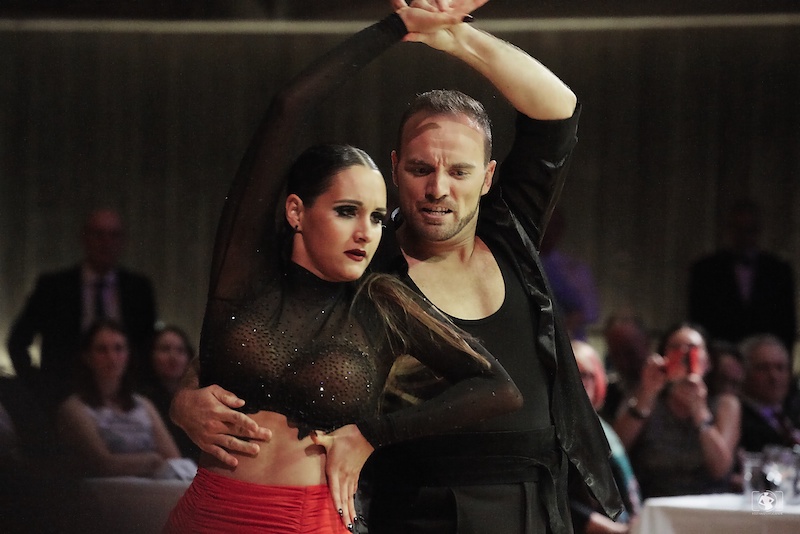Pharmpur supports Königsbrunn dance professional
Work isn’t everything in life, and a hobby is part of the work-life balance. For former Pharmpur employee Benjamin Koenigs, that’s dancing. In this interview, he talks about how he made it from amateur to professional and how Pharmpur supports him and his partner.
Introduction
I am Benjamin Koenigs, I am 33 years old and I come from Königsbrunn. I studied in Augsburg and got my Master’s degree in Business Administration there. After that I immediately started at Pharmpur and stayed there for two years. I am currently working at PCI in Augsburg. My wife and I have been professional dancers for four years now, never stopping to work full time.
What was your position at Pharmpur?
I was responsible for data management and control.
How did you get into dancing?
Considering my fairly successful career, I actually got into it relatively late. Like many other students, I attended my first dance class at the Augsburg ADTV dance school “Trautz und Salmen” at the age of 15, together with my partner Ana Koenigs and my friends. I continued with the youth performance course, in which I teach today together with the owner of the school. I then joined the dancing club TSG Bayern and changed to the so-called D-class. There, where the technical level is much higher, I encountered the first challenges.
That sounds quite strenuous
At that time it wasn’t so much about being successful, we just wanted to try it out and the training wasn’t the problem.
What was next?
You dance your way through: Each defeated couple equals one point, and you get placements as a result.
Do you still dance with the same partner today?
Yes, I do, and it’s not common. We have been dancing together since 2009, while most other dancers often change partners. The good thing about us is that we have been a couple for a long time (laughs).
How has the pandemic affected your dancing?
During the first lockdown, the dance school was completely closed. When the second one came, we were at least able to practice, although not in groups. We were allowed to take private lessons, but we didn’t have a chance because all the tournaments, workshops and so on were canceled. So we kept practicing and hoped that things would get back to normal.
How does dancing fit into your daily routine?
It depends on the training: Once you reach a certain level, it’s not enough to just dance in the dance hall. We do fitness training and yoga. We try to go to dance school three times a week if work allows. Group workouts are once a week. We try to include a private lesson in our program every two or three weeks. We usually work out once a week, either at the gym, yoga, jogging, or volleyball. We regularly work out four or five days a week.
That sounds like a lot of training!
Full-time dancers work out even more, four to five hours a day six days a week, I think.
How did the sponsorship come about?
It was and is a very, very great thing for us. Dance is unfortunately still a niche and is hardly considered a sport. Thanks to shows like “Let’s Dance,” dancing has become more popular, but that doesn’t apply to ballroom dancing. That’s not a bad thing at all, we both really enjoy watching “Let’s Dance”…. but when it comes to mid-level performances, it’s very difficult to get extra money. You have to remember that at the latest from S class (the highest amateur class, editor’s note), if you want to get ahead, you have to dance at tournaments. That means you have to spend on travel, hotels, private lessons, etc. It’s not a cheap sport, even clothes and shoes are relatively expensive. I knew that Dr. Menz is very involved and passionate about sports, and that Pharmpur supports both the AEV (the Augsburg Panthers – an ice hockey team in the German ice hockey league) and the Königsbrunner Pinguine” on a regional level. I have never made a secret of my passion and it was important for me to share it with my employer. Dr. Menz supported me from day one and was always interested in knowing about the results of the tournaments.
It goes without saying that you get some funding from dance associations or dance schools, especially as you move up in your career. Usually you get amounts in the range of 100 – 150 euros, which is great, but for comparison, a tournament dress costs at least 1,500 euros. You can easily understand how quickly the money disappears. Fortunately, we never had any problems from an economic point of view, because we both work and we didn’t overdo it with the tournaments.
In 2018, Pharmpur decided to support us. That was great because that sponsorship allowed us to do some great things that we couldn’t afford before. The biggest was the flight to Miami for the 2019 World Championships, which would not have been possible without Pharmpur.
Did the sponsorship continue after you left the company?
Yes, it was not limited to the time I was employed by Pharmpur. We only “put it on hold” last year when the pandemic changed priorities. But that was perfectly fine, and wouldn’t have made any sense at all because we haven’t been able to participate in a tournament since January 2020. It sounds really strange to say that you haven’t attended a tournament in almost a year and a half: Before the pandemic, there was one almost every weekend – especially in the regional class. But now the sponsorship has been extended again.
Are there still tournaments planned this year?
That depends on the country. In Russia it was possible to participate in dance tournaments since January, but for us it was not possible to come to the country. Now it is possible to get a sports visa, but I have to be honest: We would not feel safe there at the moment. As for Europe, all the tournaments have been postponed, and we hope that soon we will be able to dance regularly at the big competitions again. We are cautiously optimistic.
Profile
Benjamin Koenigs (née Schuler), 33, lives in Königsbrunn.
He studied in Augsburg (Master of Business Administration)
He started his professional career at Pharmpur, Königsbrunn
After two years he changed to PCI, Augsburg
Parallel to his work he has been a professional dancer for two years

